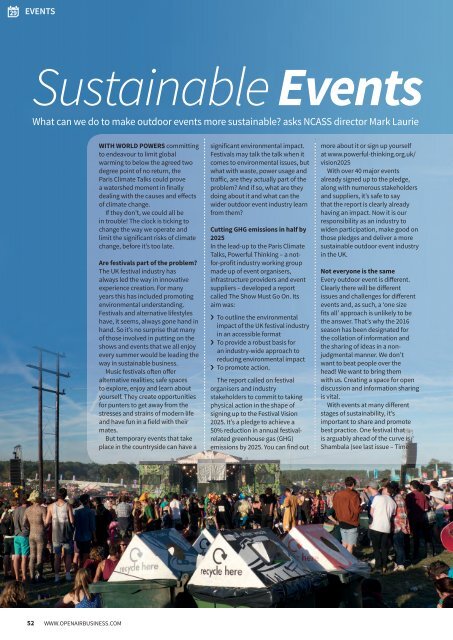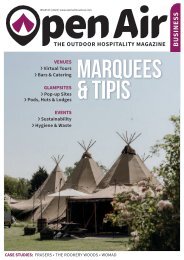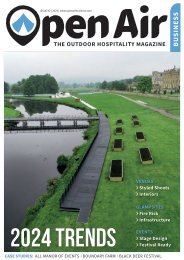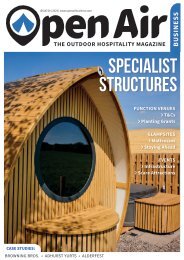Open Air Business November/December 2016
The UK's outdoor hospitality business magazine for function venues, glampsites and event organisers
The UK's outdoor hospitality business magazine for function venues, glampsites and event organisers
You also want an ePaper? Increase the reach of your titles
YUMPU automatically turns print PDFs into web optimized ePapers that Google loves.
EVENTS<br />
Sustainable Events<br />
What can we do to make outdoor events more sustainable? asks NCASS director Mark Laurie<br />
WITH WORLD POWERS committing<br />
to endeavour to limit global<br />
warming to below the agreed two<br />
degree point of no return, the<br />
Paris Climate Talks could prove<br />
a watershed moment in finally<br />
dealing with the causes and effects<br />
of climate change.<br />
If they don’t, we could all be<br />
in trouble! The clock is ticking to<br />
change the way we operate and<br />
limit the significant risks of climate<br />
change, before it’s too late.<br />
Are festivals part of the problem?<br />
The UK festival industry has<br />
always led the way in innovative<br />
experience creation. For many<br />
years this has included promoting<br />
environmental understanding.<br />
Festivals and alternative lifestyles<br />
have, it seems, always gone hand in<br />
hand. So it’s no surprise that many<br />
of those involved in putting on the<br />
shows and events that we all enjoy<br />
every summer would be leading the<br />
way in sustainable business.<br />
Music festivals often offer<br />
alternative realities; safe spaces<br />
to explore, enjoy and learn about<br />
yourself. They create opportunities<br />
for punters to get away from the<br />
stresses and strains of modern life<br />
and have fun in a field with their<br />
mates.<br />
But temporary events that take<br />
place in the countryside can have a<br />
significant environmental impact.<br />
Festivals may talk the talk when it<br />
comes to environmental issues, but<br />
what with waste, power usage and<br />
traffic, are they actually part of the<br />
problem? And if so, what are they<br />
doing about it and what can the<br />
wider outdoor event industry learn<br />
from them?<br />
Cutting GHG emissions in half by<br />
2025<br />
In the lead-up to the Paris Climate<br />
Talks, Powerful Thinking – a notfor-profit<br />
industry working group<br />
made up of event organisers,<br />
infrastructure providers and event<br />
suppliers – developed a report<br />
called The Show Must Go On. Its<br />
aim was:<br />
› To outline the environmental<br />
impact of the UK festival industry<br />
in an accessible format<br />
› To provide a robust basis for<br />
an industry-wide approach to<br />
reducing environmental impact<br />
› To promote action.<br />
The report called on festival<br />
organisers and industry<br />
stakeholders to commit to taking<br />
physical action in the shape of<br />
signing up to the Festival Vision<br />
2025. It’s a pledge to achieve a<br />
50% reduction in annual festivalrelated<br />
greenhouse gas (GHG)<br />
emissions by 2025. You can find out<br />
more about it or sign up yourself<br />
at www.powerful-thinking.org.uk/<br />
vision2025<br />
With over 40 major events<br />
already signed up to the pledge,<br />
along with numerous stakeholders<br />
and suppliers, it’s safe to say<br />
that the report is clearly already<br />
having an impact. Now it is our<br />
responsibility as an industry to<br />
widen participation, make good on<br />
those pledges and deliver a more<br />
sustainable outdoor event industry<br />
in the UK.<br />
Not everyone is the same<br />
Every outdoor event is different.<br />
Clearly there will be different<br />
issues and challenges for different<br />
events and, as such, a ‘one size<br />
fits all’ approach is unlikely to be<br />
the answer. That’s why the <strong>2016</strong><br />
season has been designated for<br />
the collation of information and<br />
the sharing of ideas in a nonjudgmental<br />
manner. We don’t<br />
want to beat people over the<br />
head! We want to bring them<br />
with us. Creating a space for open<br />
discussion and information sharing<br />
is vital.<br />
With events at many different<br />
stages of sustainability, it’s<br />
important to share and promote<br />
best practice. One festival that<br />
is arguably ahead of the curve is<br />
Shambala (see last issue – Time<br />
52 WWW.OPENAIRBUSINESS.COM


















